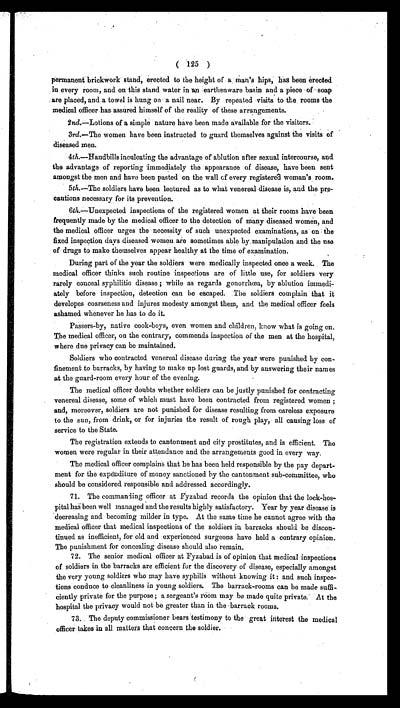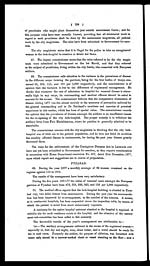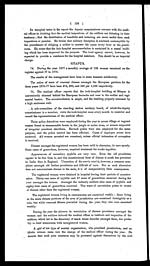Medicine - Institutions > Lock hospitals > Annual report on the working of the lock hospitals in the North-Western Provinces and Oudh > Fourth annual report on the working of the lock-hospitals in the North-Western Provinces and Oudh for the year 1877
(133) Page 125
Download files
Individual page:
Thumbnail gallery: Grid view | List view

( 125 )
permanent brickwork stand, erected to the height of a man's hips, has been erected
in every room, and on this stand water in an earthenware basin and a piece of soap
are placed, and a towel is hung on a nail near. By repeated visits to the rooms the
medical officer has assured himself of the reality of these arrangements.
2nd.—Lotions of a simple nature have been made available for the visitors.
3rd.—The women have been instructed to guard themselves against the visits of
diseased men.
4th.—Handbills inculcating the advantage of ablution after sexual intercourse, and
the advantage of reporting immediately the appearance of disease, have been sent
amongst the men and have been pasted on the wall of every registered woman's room.
5th.—The soldiers have been lectured as to what venereal disease is, and the pre-
cautions necessary for its prevention.
6th.—Unexpected inspections of the registered women at their rooms have been
frequently made by the medical officer to the detection of Many diseased women, and
the medical officer urges the necessity of such unexpected examinations, as on the
fixed inspection days diseased women are sometimes able by manipulation and the use
of drugs to make themselves appear healthy at the time of examination.
During part of the year the soldiers were medically inspected once a week. The
medical officer thinks such routine inspections are of little use, for soldiers very
rarely conceal syphilitic disease; while as regards gonorrhœa, by ablution immedi-
ately before inspection, detection can be escaped. The soldiers complain that it
developes coarseness and injures modesty amongst them, and the medical officer feels
ashamed whenever he has to do it.
Passers-by, native cook-boys, even women and children, know what is going on.
The medical officer, on the contrary, commends inspection of the men at the hospital,
where due privacy can be maintained.
Soldiers who contracted venereal disease during the year were punished by con-
finement to barracks, by having to make up lost guards, and by answering their names
at the guard-room every hour of the evening.
The medical officer doubts whether soldiers can be justly punished for contracting
venereal disease, some of which must have been contracted from registered women;
and, moreover, soldiers are not punished for disease resulting from careless exposure
to the sun, from drink, or for injuries the result of rough play, all causing loss of
service to the State.
The registration extends to cantonment and city prostitutes, and is efficient. The
women were regular in their attendance and the arrangements good in every way.
The medical officer complains that he has been held responsible by the pay depart-
ment for the expenditure of money sanctioned by the cantonment sub-committee, who
should be considered responsible and addressed accordingly.
71 The commanding officer at Fyzabad records the opinion that the lock-hos-
pital has been well managed and the results highly satisfactory. Year by year disease is
decreasing and becoming milder in type. At the same time he cannot agree with the
medical officer that medical inspections of the soldiers in barracks should be discon-
tinued as inefficient, for old and experienced surgeons have held a contrary opinion.
The punishment for concealing disease should also remain.
72 The senior medical officer at Fyzabad is of opinion that medical inspections
of soldiers in the barracks are efficient for the discovery of disease, especially amongst
the very young soldiers who may have syphilis without knowing it: and such inspec-
tions conduce to cleanliness in young soldiers. The barrack-rooms can be made suffi-
ciently private for the purpose; a sergeant's room may be made quite private. At the
hospital the privacy would not be greater than in the barrack rooms.
73 The deputy commissioner bears testimony to the great interest the medical
officer takes in all matters that concern the soldier.
Set display mode to: Large image | Zoom image | Transcription
Images and transcriptions on this page, including medium image downloads, may be used under the Creative Commons Attribution 4.0 International Licence unless otherwise stated. ![]()
| Permanent URL | https://digital.nls.uk/75111231 |
|---|




